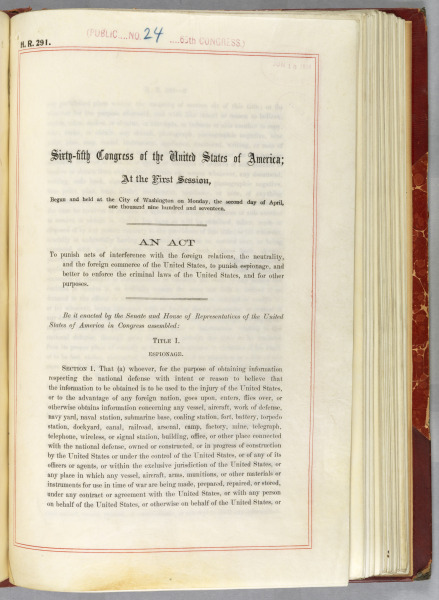

Most notably, it added a variety of prohibited acts to Title 1, section 3, including writing or uttering:Īny disloyal, profane, scurrilous, or abusive language about the form of government of the United States, or the Constitution of the United States, or the military or naval forces of the United States, or the flag of the United States, or the uniform of the Army or Navy of the United States, or any language intended to bring into contempt, scorn, contumely, or disrepute. 553), which amended the Espionage Act, on May 16, 1918. THE SEDITION ACTĪt the urging of Attorney General Gregory, Congress enacted the Sedition Act (40 Stat. Despite a direct appeal by Wilson to Congress to enact this provision, Congress removed it from the bill. Opponents included Republicans from the progressive wing of the party, such as Senators William Borah and Hiram Johnson, as well as Wilson's constant critic from the party's conservative wing, Senator Henry Cabot Lodge. The censorship provision faced stiff opposition from the press and from across the political spectrum. Use of the mails to transmit such materials was punishable by imprisonment and a fine.įinally, as originally introduced, the bill gave the president the power to censor publication of material that he deemed potentially useful to the enemy. Second, title 12 empowered the postmaster general to declare any material that violated any provision of the Espionage Act or that urged "treason, insurrection, or forcible resistance to any law of the United States" unmailable. willfully obstruct the recruiting or enlistment service of the United States." The act is remembered, however, for those provisions that affected civil liberties.įirst, Title 1, section 3, of the act made it a crime, punishable by up to twenty years' imprisonment and a $10,000 fine, to "make or convey false reports or false statements with intent to interfere with the operation or success of the military or naval forces of the United States" and to "cause or attempt to cause insubordination, disloyalty, mutiny, or refusal of duty in the military or naval forces. The Espionage Act dealt with a wide range of issues, from criminalizing various acts of espionage to protecting shipping. The Webb-Culberson legislation closely resembled these failed bills. Congress declined to enact these bills in June 1916 and during the winter of 1917. Gregory had proposed legislation on behalf of the Wilson administration that would punish espionage and curtail disloyal speech. Twice before April 1917, Attorney General Thomas W. Wilson added that such advocates of "disloyalty, and anarchy must be crushed out."
#ESPIONAGE AND SEDITION ACTS FULL#
born under other flags but welcomed by our generous naturalization laws to the full freedom and opportunity of America, who have poured the poison of disloyalty into the very arteries of our national life" (Shaw 1924, p. On December 7, 1915, congressmen and senators reacted enthusiastically when Wilson proclaimed in his Third Annual Message to Congress: "There are citizens of the United States.

Democrats and Republicans both appealed to popular anxiety about the loyalty of so-called "hyphenate Americans," especially German-American and Irish-American immigrants. foreign policy shifted toward support of Great Britain, the administration became increasingly concerned about criticism of its policies and about pro-German propaganda. Despite official neutrality, beginning in July 1915, the United States embarked on a program of military preparedness and financial and material support of Great Britain and its allies. 217).Įven before America's entry into war, the Wilson administration had sought such legislation. On June 15, 1917, after much debate and some alteration, Congress enacted these bills into law as the Espionage Act (40 Stat. Later that night, Representative Edwin Webb, of North Carolina, and Senator Charles Culberson, of Texas, introduced bills in the House of Representatives and the Senate to deal with espionage and treason. On the evening of April 2, 1917, President Woodrow Wilson addressed a joint session of Congress seeking a declaration of war against Germany and its allies. Espionage Act (1917) and Sedition Act (1918)


 0 kommentar(er)
0 kommentar(er)
